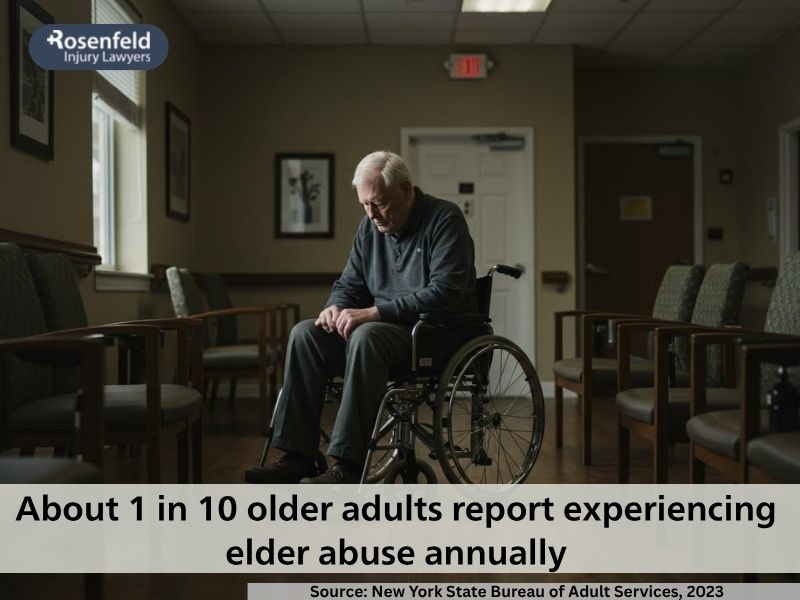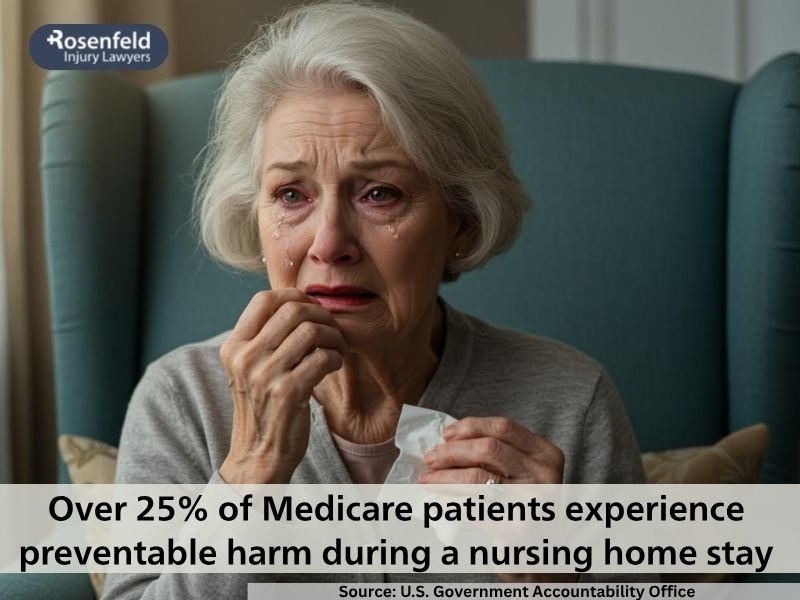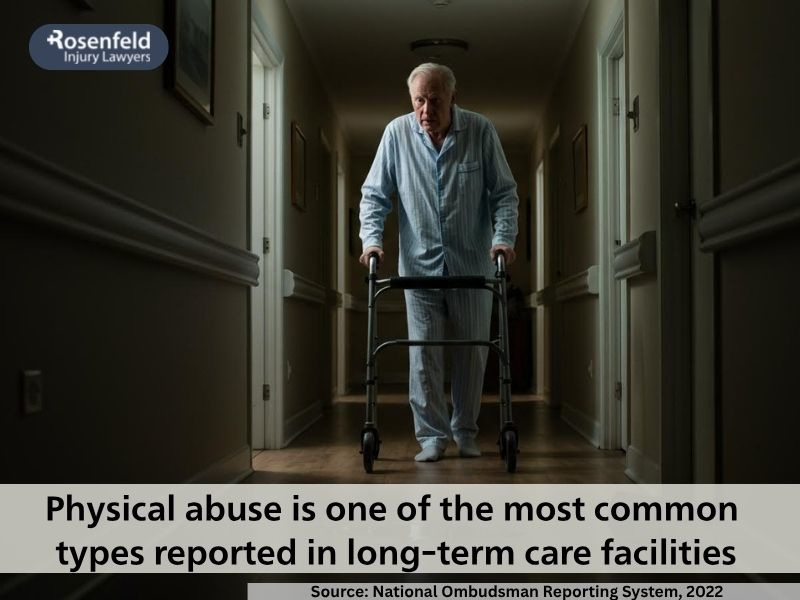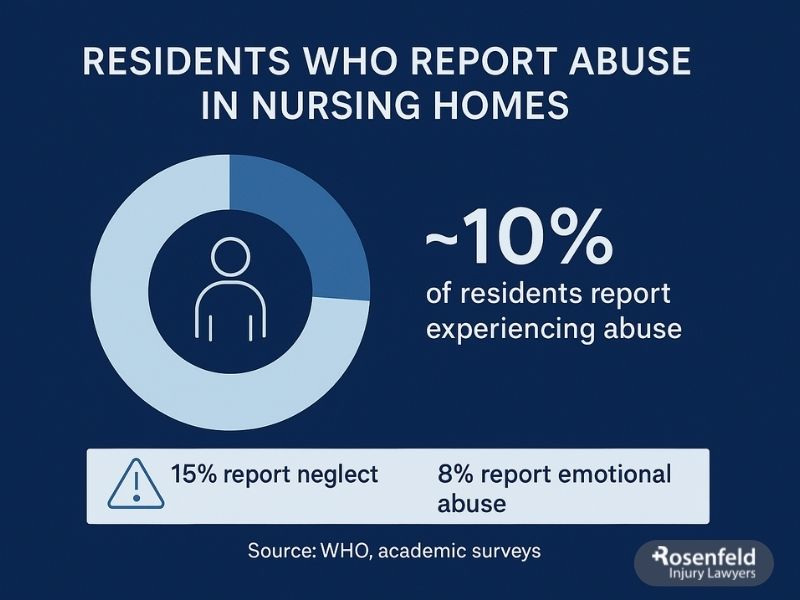How Common Is Nursing Home Abuse?

At Injury Lawyer Team, we’re called when families in our community see warning signs of potential abuse in local nursing homes and want answers. How common is nursing home abuse? Sadly, more common than most realize.
Behind polite lobbies and daily charts, older adults can face physical abuse, emotional abuse, sexual abuse, financial abuse, as well as neglect that leave lasting physical injuries and emotional distress. We help family members of abused residents cut through silence and confusion, document what happened, and pursue abuse lawsuits to hold nursing facilities and staff members accountable.
When you reach out to us, you get a team that knows how these cases work on the ground: speaking with nurses and aides, securing medical records, preserving surveillance footage, and coordinating independent medical evaluations.
Whether the harm involves broken bones, head injuries, poor hygiene, medication errors, or psychological and emotional abuse, we move quickly to protect your loved one, stop future abuse, and seek justice. If you suspect nursing home abuse, we’re here to listen and help.
Nursing Home Abuse Statistics
Understanding how common is nursing home abuse requires looking beyond isolated incidents to national and global research. According to recent elder abuse statistics, elder mistreatment in institutional settings, such as long-term care facilities and nursing homes, remains alarmingly prevalent.
How Prevalent Is Nursing Home Abuse?
Abuse in nursing homes is far more widespread than official reports suggest. According to the World Health Organization (WHO), almost two-thirds (≈64%) of nursing home staff admitted to committing some form of abuse against residents in the past year, including neglect, emotional abuse, and physical harm.
In the same report, roughly 1 in 6 adults aged 60 or older have experienced abuse in community settings during the past year, but the rates are significantly higher within institutional environments such as nursing homes.
Gender Breakdown
Studies show that elder abuse affects both men and women, but women are disproportionately impacted. For instance, according to the American College of Obstetricians and Gynecologists (ACOG), over 65% of reported elder abuse victims in the U.S. are women.
Women’s greater longevity, higher likelihood of living alone, and increased prevalence of cognitive or physical impairments contribute to their heightened risk. While gender‐specific data for nursing-home settings is limited, this broader trend indicates that when assessing abuse in long-term care facilities, extra vigilance around female residents is warranted.
Who Commits Abuse?
In nursing homes, staff members, including nurses, nursing aides, and other caregivers, commit most abuse incidents. The WHO found that around two-thirds of employees in institutional settings admitted to engaging in at least one form of abuse.
However, abuse in elder populations is not limited to facility staff. In a study of calls to the National Center on Elder Abuse (NCEA) resource line, family members were the most commonly identified perpetrators (46.8 % of cases) in community settings. In nursing homes, both staff-on-resident and resident-on-resident abuse have been documented.

Causes and Risk Factors
Several systemic and individual factors increase the risk of abuse and neglect in nursing homes:
- Low staffing and inadequate training correlate directly with higher rates of physical and emotional trauma. Understaffed facilities often fail to meet basic care needs, leading to neglect and subpar hygiene.
- Institutional stressors, such as overworked staff and lack of oversight, contribute to high rates of abuse going undetected or unreported.
- Cognitive or physical disabilities such as Alzheimer’s disease, dementia, or immobility elevate vulnerability to mistreatment.
- An investigation found that nursing homes housing larger numbers of residents with serious mental illness were cited more frequently for abuse violations, especially in facilities with fewer caregivers.
Effects of Abuse
Research confirms that elder abuse in institutional and community settings causes serious harm to older adults, both immediately and over time. The condition known as elder abuse, encompassing emotional and physical abuse, economic exploitation, sexual abuse, and neglect, has documented associations with increased risk of hospitalization, poorer physical health, and higher mortality.
A U.S. community-based study published in JAMA Internal Medicine found that among older adults reported for abuse (not strictly nursing home residents), the risk of death was significantly elevated. Specifically, in a cohort of 9,318 participants, those reported for elder abuse had a 39% higher overall mortality rate compared to non-abused counterparts seven years into the study.
These findings underscore that abuse or neglect isn’t simply a matter of immediate injury or emotional trauma, it also correlates with substantially higher risk of premature death, poorer physical outcomes, and increased healthcare utilization.
Statistics on Reporting Nursing Home Abuse
Underreporting is one of the most serious problems in elder protection. The National Council of Aging (NCOA) estimates that only 1 in 24 cases of elder abuse ever comes to the attention of authorities.
A 2025 report from the U.S. Department of Health and Human Services Office of Inspector General (OIG) revealed that nursing homes failed to report 43% of serious falls resulting in hospitalization, violating federal reporting requirements. This suggests that even when residents sustain major injuries, facilities often do not file required incident reports.
The Correlation of Mental Health Issues and Nursing Home Abuse
A landmark 2025 national survey by APM Reports uncovered a clear link between serious mental illness and higher rates of abuse in U.S. nursing homes. About 1 in 5 residents lives with a serious mental illness such as schizophrenia or bipolar disorder, and nearly 500 nursing homes have populations where half or more of residents are mentally ill.
Facilities with lower staffing levels and for-profit ownership received more abuse-related citations, and one-third of those citations resulted in no federal fine. The data show that understaffed facilities serving residents with complex psychiatric needs face the highest abuse risk, underscoring the need for stronger oversight and mental health–specific care standards.

Financial Exploitation Among the Elderly Population
A population-based study of 4,156 adults aged 60 and older published in the Journal of General Internal Medicinefound that 2.7% of older adults experienced financial exploitation within one year, and 4.7% reported such abuse during their lifetime.
The research identified specific risk factors that increased vulnerability, including poverty (+72%), functional limitations (+69%), living with non-spousal household members (+16%), and Black/African American race (+380%).
For lifetime prevalence, the same study found that certain factors substantially increased the risk of being exploited financially.
African American or Black older adults faced more than double the risk (+261%) compared to White counterparts, while poverty (+147%), living with non-spousal household members (+116%), and functional impairments, including at least one instrumental activity of daily living (IADL) limitation (+145%) or basic activity of daily living (ADL) limitation (+152%) were also significant predictors.
In contrast, living with a spouse or partner reduced lifetime risk by more than half (-39%).
The authors concluded that financial abuse often co-occurs with emotional or psychological abuse, particularly among individuals with dementia, cognitive decline, or social isolation. Though the study focused on community-dwelling seniors, these findings mirror patterns seen in nursing home residents, where dependency and limited oversight similarly heighten the risk of financial mistreatment.
Types of Elder Abuse in Nursing Homes
Abuse in nursing homes can take many forms, each with devastating effects on residents’ physical health, mental well-being, and dignity. Understanding these categories helps families recognize the warning signs and take prompt action to report nursing home abuse and protect their loved ones.
Physical Abuse
Physical nursing home abuse involves the use of force that causes injury, pain, or impairment. This may include hitting, slapping, pushing, kicking, restraining residents improperly, or withholding medication and mobility aids.
Common injuries include bruises, broken bones, head trauma, and unexplained marks. Physical abuse often goes hand in hand with neglect, where residents are left unattended for long periods, increasing the risk of falls and medical complications.
Emotional Abuse
Emotional or psychological abuse includes verbal abuse, humiliation, intimidation, or isolation that causes emotional trauma. Examples include yelling at residents, ignoring their needs, or preventing them from seeing family members.
Victims often show signs such as fearfulness, withdrawal, depression, post-traumatic stress disorder (PTSD), or sudden changes in behavior. Psychological trauma can be as damaging as physical mistreatment, leading to anxiety, post-traumatic stress, and emotional deterioration over time.
Financial Abuse
Financial abuse occurs when staff members or others exploit a resident’s money, property, or assets for personal gain. This may involve forging checks, stealing cash or belongings, coercing residents into signing financial documents, or misusing power of attorney, particularly those elders facing cognitive decline or social isolation are most vulnerable to financial manipulation.
In nursing homes, weak financial controls and unsupervised access to residents’ funds often enable these violations.

Sexual Abuse
Sexual abuse in nursing homes includes any form of non-consensual sexual contact or behavior with a resident, including inappropriate touching, forced nudity, or assault. Many victims have cognitive disabilities or physical limitations that prevent them from resisting or reporting the abuse. These cases are among the most traumatic forms of mistreatment of elders and require immediate intervention.
If you believe your loved one has been sexually assaulted in a care facility, contact a nursing home sexual abuse lawyerimmediately. Legal action can help protect the survivor, hold the abuser and facility accountable, and prevent further harm to other residents.
Neglect
Neglect is often the most overlooked, yet the most common form of abuse in nursing facilities. It occurs when staff fail to provide essential care, including proper hygiene, nutrition, hydration, medication, or medical care.
Signs of neglect include bedsores, infections, malnutrition, dehydration, inadequate hygiene, and unattended medical conditions. Chronic understaffing and poor training are major causes of neglect, and these failures can lead to serious injuries, hospitalization, or even early death.
Each of these forms of abuse: physical, emotional, financial, sexual, neglect, and other forms of mistreatment, violate both ethical and legal standards of care. Recognizing them early and pursuing justice through abuse lawsuits can protect residents, stop ongoing mistreatment, and help hold negligent nursing homes accountable.
FAQs
What legal rights do nursing home residents have following abuse and neglect?
Nursing home residents are protected under several federal laws that guarantee their right to safety, dignity, and quality care. The Nursing Home Reform Act of 1987 (part of the Omnibus Budget Reconciliation Act, 42 U.S.C. § 1395i-3 and § 1396r) establishes residents’ rights to be free from abuse, neglect, and exploitation in all federally funded nursing facilities.
The Older Americans Act (42 U.S.C. § 3001 et seq.) and the Elder Justice Act of 2010 (42 U.S.C. § 1397j-1397m) further support oversight, reporting, and enforcement mechanisms for elder protection. These laws require nursing homes to maintain safe environments, train staff, and report any suspected abuse to state and federal authorities.
What medical records are needed to prove nursing home abuse?
Proving a nursing home abuse case often depends on detailed medical documentation. Key evidence includes hospital and emergency department records, physician notes, nursing logs, incident reports, photographs of injuries, medication records, and staff communication charts.
These records can establish timelines, show inconsistencies in care, and link physical injuries or emotional trauma directly to neglect or abuse.
If you suspect nursing home abuse, preserve all medical documentation immediately and consult an experienced attorney who can subpoena additional facility records and expert testimony to support your claim.
Where is elder abuse reported?
If you need to report nursing home abuse, you can contact your state’s Adult Protective Services (APS) agency, the local Long-Term Care Ombudsman, or call the Eldercare Locator at 1-800-677-1116 for guidance.
In emergencies or when immediate harm is suspected, contact 911 or local law enforcement right away. To learn more or locate your state reporting office, visit the National Center on Elder Abuse website.
Secure Expert Counsel
At Injury Lawyer Team, we understand that discovering abuse or neglect in a nursing home can be overwhelming. Families often feel betrayed, angry, and unsure of where to turn. Our attorneys handle these cases with compassion and precision, investigating records, consulting medical experts, and holding negligent facilities accountable through abuse lawsuits.
We’ve represented victims and family members in cases involving physical abuse, emotional trauma, financial manipulation, and sexual assault in long-term care facilities.
Our goal is to hold nursing homes accountable, protect vulnerable residents, and ensure that nursing homes meet the standards of care required under federal and state law. If you suspect wrongdoing, don’t wait to report abuse. Abuse can worsen chronic conditions and increase the need for ongoing health care and medical supervision.
We handle all cases on a contingency fee basis, meaning you pay nothing upfront, and we only get paid if we win compensation for you. To learn more about your legal options or discuss your case confidentially, contact us today for a free consultation. Our nursing home abuse attorneys are ready to stand with you and fight for justice.
All content undergoes thorough legal review by experienced attorneys, including Jonathan Rosenfeld. With 25 years of experience in personal injury law and over 100 years of combined legal expertise within our team, we ensure that every article is legally accurate, compliant, and reflects current legal standards.








